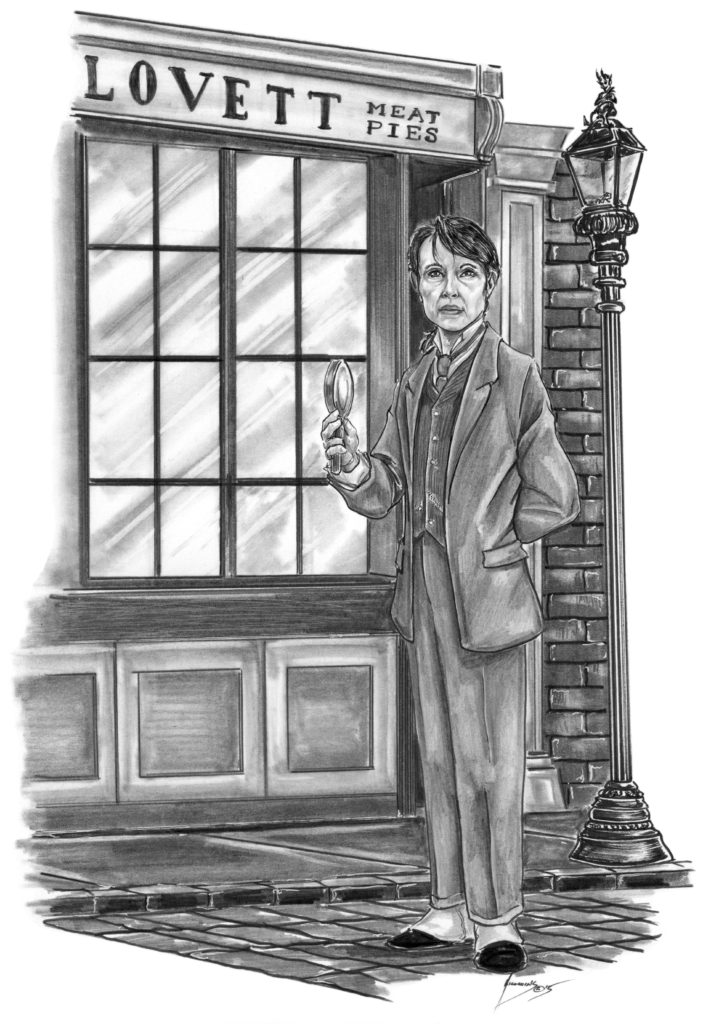 In the 1879 Player’s Guide, we introduced the Profession of the Investigator thusly:
In the 1879 Player’s Guide, we introduced the Profession of the Investigator thusly:
Someone has to find out what happened. Someone has to dig through the trash, find the murder weapon, and solve the crime. Someone has to catch the cheating spouse in the act. Someone is going to need a large whiskey at the end of their day, after dealing with the worst of human behavior. The Investigator deliberately looks into areas most people avoid. If the questions make people uncomfortable, that just might be evidence of guilt. The cynical demeanor starts as armor, but there comes a point where it soaks in and becomes part of everyday living. The world doesn’t get better. People still do each other over, steal, betray, and kill. So one mess got cleaned up. There’s still a world full of trouble out there waiting for someone to get to it.
Now, detectives should be able to analyse the clues, and so our Investigator gets Evidence Analysis as their Profession Skill, the one everything else revolves around. They should notice things, especially the small items that the average person might overlook, and so Awareness is a Core Skill at their Initiate Tier, one they can learn during character build and later spend Karma on if they need to. Detectives should pick up on microexpressions, body language, all the telltales that indicate whether a suspect is telling the truth or lying, and so we gave the Investigator Empathic Sense.
In the forthcoming 1879 Companion, we’ll be expanding the Investigator, like the other Player’s Guide Professions, with the Warden and Master Tiers, including Skill pools and Abilities. Great detectives have things they can do that make them distinctive. We’ve picked three major feats for our Investigator, that player characters can learn at the Journeyman, Warden, and Master Tier.
At Journeyman (included in the Player’s Guide), the Investigator can make a “Brilliant Deduction”. This is the Sherlock Holmes trick, of looking at a few stray clues and figuring out the larger picture, like being able to glance at a handful of pieces from a jigsaw puzzle and determining that it’s a picture of a covered bridge in a snow-covered valley. Holmes used this to tell people their profession, spotting the ink-stain on the thumb of a printer, or the callous on the hand of a sailor. The Investigator gets a chance to do this, by spending a bit of Strain in order to ask the Gamemaster a simple question, that the Gamemaster then has to answer truthfully. This gives the player and the Gamemaster a way to get information into the scenario through a mechanic and a bit of roleplaying, instead of the Gamemaster having to trot out Captain Exposition time and again. Often, just one question is enough to give the players the clue they might have otherwise missed, and keep the plot on track.
At Warden, the Investigator gains the ability to learn from their enemies. We’ve all seen the noir detective realize something important in the middle of being beaten up by their adversaries. Sun Tzu commented on the enemy’s time and method of attack revealing their overall strategy and how they think. By purchasing the ability of “In Dolor Veritas”, the Investigator turns each Wound or Social Attack into yet another clue.
At Master, the Investigator is well read enough to know mountains of trivia relevant to their career. Holmes wrote a monograph on the various types of tobacco ash. We’ve seen fictional detectives pull some obscure fact that only three people in the world could possibly know out of thin air and use it to build an entire theory of the crime. We couldn’t resist the Jeopardy reference here, and so “Things Only I Would Know for £500″ allows the Investigator to do just that. It’s an expensive Ability, requiring the Investigator to spend a Wound’s worth of Strain. The player and the Gamemaster need to cooperate on the specific fact, coming up with something odd but still relevant that somehow ties things together.
With all of these Abilities, we’ve given the player and the Gamemaster tools to encourage roleplaying, and to keep the plot on track, allowing the character to pick up on clues through a game mechanic if the player is stumped. If you’ve played a detective character in other games, let us know in the Comments to this blog entry how that went, and how you think playing an Investigator in 1879 might go.
